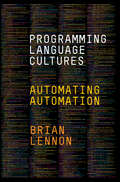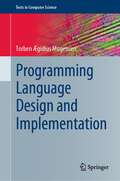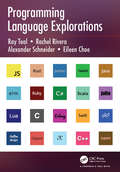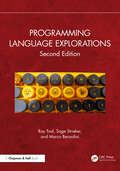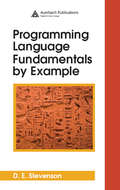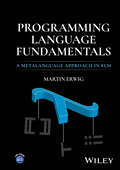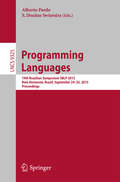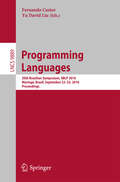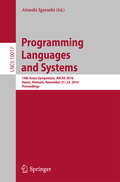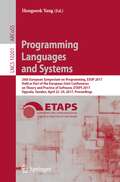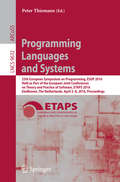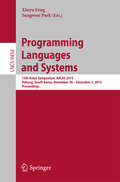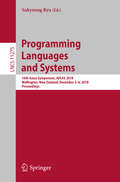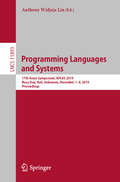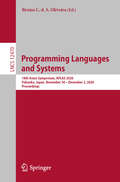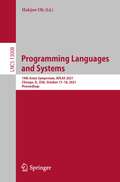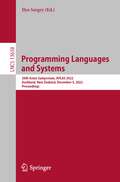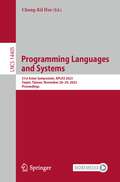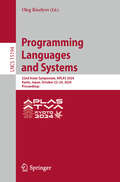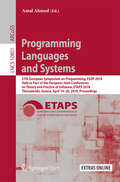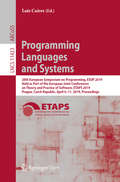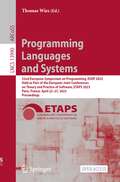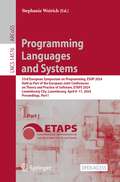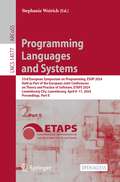- Table View
- List View
Programming Language Cultures: Automating Automation
by Brian LennonIn this book, Brian Lennon demonstrates the power of a philological approach to the history of programming languages and their usage cultures. In chapters focused on specific programming languages such as SNOBOL and JavaScript, as well as on code comments, metasyntactic variables, the very early history of programming, and the concept of DevOps, Lennon emphasizes the histories of programming languages in their individual specificities over their abstract formal or structural characteristics, viewing them as carriers and sometimes shapers of specific cultural histories. The book's philological approach to programming languages presents a natural, sensible, and rigorous way for researchers trained in the humanities to perform research on computing in a way that draws on their own expertise. Combining programming knowledge with a humanistic analysis of the social and historical dimensions of computing, Lennon offers researchers in literary studies, STS, media and digital studies, and technical fields the first technically rigorous approach to studying programming languages from a humanities-based perspective.
Programming Language Design and Implementation (Texts in Computer Science)
by Torben Ægidius MogensenThis textbook is intended as a guide for programming-language designers and users to better help them understand consequences of design decisions.The text aims to provide readers with an overview of the design space for programming languages and how design choices affect implementation. It is not a classical compilers book, as it assumes the reader is familiar with basic compiler implementation techniques; nor is it a traditional comparative programming languages book, because it does not go into depth about any particular language, instead taking examples from a wide variety of programming languages to illustrate design concepts. Readers are assumed to already have done at least a bit of programming in functional, imperative, and object-oriented languages.Topics and features:Provides topic-by-topic coverage of syntax, types, scopes, memory management and moreIncludes many technical exercises and discussion exercisesInspires readers to think about language design choices, how these interact, and how they can be implementedCovers advanced topics such as formal semantics and limits of computationSuitable for advanced undergraduates and beginning graduates, this highly practical and useful textbook/guide will also offer programming language professionals a superb reference and learning toolkit.
Programming Language Explorations
by Ray Toal Rachel Rivera Alexander Schneider Eileen Choe<P><P><i>Advisory: Bookshare has learned that this book offers only partial accessibility. We have kept it in the collection because it is useful for some of our members. Benetech is actively working on projects to improve accessibility issues such as these.</i> <P><P> Programming Language Explorations is a tour of several modern programming languages in use today. The book teaches fundamental language concepts using a language-by-language approach. As each language is presented, the authors introduce new concepts as they appear, and revisit familiar ones, comparing their implementation with those from languages seen in prior chapters. The goal is to present and explain common theoretical concepts of language design and usage, illustrated in the context of practical language overviews. <P><P>Twelve languages have been carefully chosen to illustrate a wide range of programming styles and paradigms. The book introduces each language with a common trio of example programs, and continues with a brief tour of its basic elements, type system, functional forms, scoping rules, concurrency patterns, and sometimes, metaprogramming facilities. <P><P>Each language chapter ends with a summary, pointers to open source projects, references to materials for further study, and a collection of exercises, designed as further explorations. Following the twelve featured language chapters, the authors provide a brief tour of over two dozen additional languages, and a summary chapter bringing together many of the questions explored throughout the text. <P><P>Targeted to both professionals and advanced college undergraduates looking to expand the range of languages and programming patterns they can apply in their work and studies, the book pays attention to modern programming practice, covers cutting-edge languages and patterns, and provides many runnable examples, all of which can be found in an online GitHub repository. The exploration style places this book between a tutorial and a reference, with a focus on the concepts and practices underlying programming language design and usage. Instructors looking for material to supplement a programming languages or software engineering course may find the approach unconventional, but hopefully, a lot more fun.
Programming Language Explorations
by Ray Toal Sage Strieker Marco BerardiniProgramming Language Explorations helps its readers gain proficiency in programming language practice and theory by presenting both example-focused, chapter-length explorations of fourteen important programming languages and detailed discussions of the major concepts transcending multiple languages. A language-by-language approach is sandwiched between an introductory chapter that motivates and lays out the major concepts of the field and a final chapter that brings together all that was learned in the middle chapters into a coherent and organized view of the field.Each of the featured languages in the middle chapters is introduced with a common trio of example programs and followed by a tour of its basic language features and coverage of interesting aspects from its type system, functional forms, scoping rules, concurrency patterns, and metaprogramming facilities. These chapters are followed by a brief tour of over 40 additional languages designed to enhance the reader’s appreciation of the breadth of the programming language landscape and to motivate further study.Targeted to both professionals and advanced college undergraduates looking to expand the range of languages and programming patterns they can apply in their work and studies, the book pays attention to modern programming practices, keeps a focus on cutting-edge programming patterns, and provides many runnable examples, all of which are available in the book’s companion GitHub repository. The combination of conceptual overviews with exploratory example-focused coverage of individual programming languages provides its readers with the foundation for more effectively authoring programs, prompting AI programming assistants, and, perhaps most importantly, learning—and creating—new languages.
Programming Language Fundamentals by Example
by D.E. StevensonSurveying the major programming languages that have hallmarked the evolution of computing, Programming Language Fundamentals by Example provides an understanding of the many languages and notations used in computer science, the formal models used to design phases, and the foundations of languages including linguistics. This textbook guides students through the process of implementing a simple interpreter with case-based exercises, questions, and a semester-long project that encompasses all of the concepts and theories presented in the book into one concrete example. It covers also such topics as formal grammars, automata, denotational and axiomatic semantics, and rule-based presentation.
Programming Language Fundamentals: A Metalanguage Approach in Elm
by Martin ErwigPROGRAMMING LANGUAGE FUNDAMENTALS Understand the key principles of programming languages Programming languages are the tools needed to let algorithms run on electronic computers. As they form the linguistic interface between humans and machines, the understanding of programming languages is essential for being able to control machine behavior. Programming Language Fundamentals offers a precise, comprehensive introduction to the principles that are the basis of most programming languages. Explaining both functional programming and logic programming, it presents a broad perspective on programming and constitutes an indispensable introduction to the foundations of programming languages. Programming Language Fundamentals readers will also find: Introduction to Elm as a metalanguage to encourage thinking and experimenting with programming languages in a formal way Detailed discussion of topics including abstract syntax, semantics, types, and more In-depth explanations of key concepts such as scope and parameter passing Programming Language Fundamentals is ideal for undergraduate students in computer science, as well as researchers and practitioners working with programming languages who are looking to broaden their understanding of the field.
Programming Languages
by Alberto Pardo S. Doaitse SwierstraThis book constitutes the proceedings of the 19th Brazilian Symposium on Progamming Languages, SBLP 2015, held in Belo Horizonte, Brazil, in September 2015. The 10 papers presented in this volume were carefully reviewed and selected from 26 submissions. They deal with fundamental principles and innovations in the design and implementation of programming languages and systems.
Programming Languages
by Fernando Castor Yu David LiuThis book constitutes the proceedings of the 20th Brazilian Symposium on Progamming Languages, SBLP 2016, held in Maring#65533;, Brazil, in September 2016. The 12 papers presented in this volume were carefully reviewed and selected from 26 submissions. They deal with fundamental principles and innovations in the design and implementation of programming languages and systems.
Programming Languages and Systems
by Atsushi IgarashiThis book constitutes the refereed proceedings of the 14th Asian Symposium on Programming Languages and Systems, APLAS 2016, held in Hanoi, Vietnam, in November 2016. The papers cover a variety of topics such as semantics, logics, and foundational theory; design of languages type systems, and foundational calculi; domain-specific languages; compilers, interpreters, and abstract machines; program derivation, synthesis and transformation; program analysis, verification, and model-checking; logic, constraint, probabilistic and quantum programming; software security; concurrency and parallelism; tools for programming and implementation.
Programming Languages and Systems
by Hongseok YangThis book constitutes the proceedings of the 26th European Symposium on Programming, ESOP 2017, which took place in Uppsala, Sweden in April 2017, held as Part of the European Joint Conferences on Theory and Practice of Software, ETAPS 2017. The 36 papers presented in this volume were carefully reviewed and selected from 112 submissions. They cover traditional as well as emerging topics in programming languages. In detail they deal with semantic foundation and type system for probabilistic programming; techniqu3es for verifying concurrent or higher-order programs; programming languages for arrays or web data; program analysis and verification of non-standard program properties; foundation and application of interactive theorem proving; graph rewriting; separation logic; session type; type theory; and implicit computational complexity.
Programming Languages and Systems
by Peter ThiemannThis bookconstitutes the proceedings of the 25th European Symposium on Programming, ESOP2016, which took place in Eindhoven, The Netherlands, in April 2016, held asPart of the European Joint Conferences on Theory and Practice of Software,ETAPS 2016. The 29 papers presented in this volume were carefully reviewed and selectedfrom 98 submissions. Being devoted to fundamental issues in the specification,design, analysis, and implementation of programming languages and systems, ESOPfeatures contributions on all aspects of programming language research;theoretical and/or practical advances.
Programming Languages and Systems
by Xinyu Feng Sungwoo ParkThis book constitutes the refereed proceedings of the 13th Asian Symposium on Programming Languages and Systems, APLAS 2015, held in Pohang, South Korea, in November/December 2015. The 24 regular papers presented together with 1 short paper were carefully reviewed and selected from 74 submissions. The papers cover a variety of foundational and practical issues in programming languages and systems and have been organized in topical sections on compilers, separation logic, static analysis and abstract interpretation, Hoare logic and types, functional programming and semantics, model checking, program analysis, medley, and programming models.
Programming Languages and Systems: 16th Asian Symposium, APLAS 2018, Wellington, New Zealand, December 2–6, 2018, Proceedings (Lecture Notes in Computer Science #11275)
by Sukyoung RyuThis book constitutes the proceedings of the 16th Asian Symposium on Programming Languages and Systems, APLAS 2018, held in Wellington, New Zealand, in December 2018.The 22 papers presented in this volume were carefully reviewed and selected from 51 submissions. They are organized in topical sections named: types; program analysis; tools; functional programs and probabilistic programs; verification; logic; and continuation and model checking.
Programming Languages and Systems: 17th Asian Symposium, APLAS 2019, Nusa Dua, Bali, Indonesia, December 1–4, 2019, Proceedings (Lecture Notes in Computer Science #11893)
by Anthony Widjaja LinThis book constitutes the proceedings of the 17th Asian Symposium on Programming Languages and Systems, APLAS 2019, held in Nusa Dua, Bali, Indonesia, in December 2019. The 22 papers presented in this volume were carefully reviewed and selected from 50 submissions. They were organized in topical sections named: Invited Papers, Types, Program Analysis, Semantics, Language Design and Implementation, Concurrency, Verification, and Logic and Automata.
Programming Languages and Systems: 18th Asian Symposium, APLAS 2020, Fukuoka, Japan, November 30 – December 2, 2020, Proceedings (Lecture Notes in Computer Science #12470)
by Bruno C. d. S. OliveiraThis book constitutes the proceedings of the 18th Asian Symposium on Programming Languages and Systems, APLAS 2020, held in Fukuoka, Japan, in December 2020.*The 19 papers presented in this volume were carefully reviewed and selected from 46 submissions. They were organized in topical sections named: Invited Papers, Types, Program Analysis, Semantics, Language Design and Implementation, Concurrency, Verification, and Logic and Automata. * The conference was held virtually due to the COVID-19 pandemic.
Programming Languages and Systems: 19th Asian Symposium, APLAS 2021, Chicago, IL, USA, October 17–18, 2021, Proceedings (Lecture Notes in Computer Science #13008)
by Hakjoo OhThis book constitutes the proceedings of the 19th Asian Symposium on Programming Languages and Systems, APLAS 2021, held in Chicago, USA, in October 2021.* The 17 papers presented in this volume were carefully reviewed and selected from 43 submissions. They were organized in topical sections named: analysis and synthesis, compilation and transformation, language, and verification. * The conference was held in a hybrid format due to the COVID-19 pandemic.
Programming Languages and Systems: 20th Asian Symposium, APLAS 2022, Auckland, New Zealand, December 5, 2022, Proceedings (Lecture Notes in Computer Science #13658)
by Ilya SergeyThis book constitutes the proceedings of the 20th Asian Symposium on Programming Languages and Systems, APLAS 2022, held in Auckland, New Zealand, in December 2022.The 10 papers presented in this volume were carefully reviewed and selected from 22 submissions. They were organized in topical sections as follows: Semantics and Analysis; Testing and Verification; Types.
Programming Languages and Systems: 21st Asian Symposium, APLAS 2023, Taipei, Taiwan, November 26–29, 2023, Proceedings (Lecture Notes in Computer Science #14405)
by Chung-Kil HurThis book constitutes the refereed proceedings of the 21st Asian Symposium on Programming Languages and Systems, APLAS 2023, held in Taipei, Taiwan, during November 26–29, 2023.The 15 full papers included in this book are carefully reviewed and selected from 32 submissions. They were organized in topical sections as follows: semantics, logics, and foundational theory; design of languages, type systems, and foundational calculi; domain-specific languages; compilers, interpreters, and abstract machines; program derivation, synthesis, and transformation; program analysis, verification, and model-checking; logic, constraint, probabilistic, and quantum programming; software security; concurrency and parallelism; tools and environments for programming and implementation; and applications of SAT/SMT to programming and implementation.
Programming Languages and Systems: 22nd Asian Symposium, APLAS 2024, Kyoto, Japan, October 22-24, 2024, Proceedings (Lecture Notes in Computer Science #15194)
by Oleg KiselyovThis book constitutes the proceedings of the 22nd Asian Symposium on Programming Languages and Systems, APLAS 2024, held in Kyoto, Japan, during October 22-24, 2024. The 18 full papers presented here were carefully reviewed and selected from 37 submissions. These papers have been categorized under the following topical sections: Type theory and Semantic Frameworks; Probabilistic and Declarative Programming; Quantum Computation; Logical Relations; Verification.
Programming Languages and Systems: 26th European Symposium on Programming, ESOP 2017, Held as Part of the European Joint Conferences on Theory and Practice of Software, ETAPS 2017, Uppsala, Sweden, April 22–29, 2017, Proceedings (Lecture Notes in Computer Science #10201)
by Hongseok YangThis book constitutes the proceedings of the 26th European Symposium on Programming, ESOP 2017, which took place in Uppsala, Sweden in April 2017, held as Part of the European Joint Conferences on Theory and Practice of Software, ETAPS 2017.The 36 papers presented in this volume were carefully reviewed and selected from 112 submissions. They cover traditional as well as emerging topics in programming languages. In detail they deal with semantic foundation and type system for probabilistic programming; techniqu3es for verifying concurrent or higher-order programs; programming languages for arrays or web data; program analysis and verification of non-standard program properties; foundation and application of interactive theorem proving; graph rewriting; separation logic; session type; type theory; and implicit computational complexity.
Programming Languages and Systems: 27th European Symposium On Programming, Esop 2018, Held As Part Of The European Joint Conferences On Theory And Practice Of Software, Etaps 2018, Thessaloniki, Greece, April 14-20, 2018, Proceedings (Lecture Notes in Computer Science #10801)
by Amal AhmedThis open access book constitutes the proceedings of the 27th European Symposium on Programming, ESOP 2018, which took place in Thessaloniki, Greece in April 2018, held as Part of the European Joint Conferences on Theory and Practice of Software, ETAPS 2018. The 36 papers presented in this volume were carefully reviewed and selected from 114 submissions. The papers are organized in topical sections named: language design; probabilistic programming; types and effects; concurrency; security; program verification; program analysis and automated verification; session types and concurrency; concurrency and distribution; and compiler verification.
Programming Languages and Systems: 28th European Symposium on Programming, ESOP 2019, Held as Part of the European Joint Conferences on Theory and Practice of Software, ETAPS 2019, Prague, Czech Republic, April 6–11, 2019, Proceedings (Lecture Notes in Computer Science #11423)
by Luís CairesThis open access book constitutes the proceedings of the 28th European Symposium on Programming, ESOP 2019, which took place in Prague, Czech Republic, in April 2019, held as Part of the European Joint Conferences on Theory and Practice of Software, ETAPS 2019.
Programming Languages and Systems: 32nd European Symposium on Programming, ESOP 2023, Held as Part of the European Joint Conferences on Theory and Practice of Software, ETAPS 2023, Paris, France, April 22–27, 2023, Proceedings (Lecture Notes in Computer Science #13990)
by Thomas WiesThis open access book constitutes the proceedings of the 32nd European Symposium on Programming, ESOP 2023, which was held during April 22-27, 2023, in Paris, France, as part of the European Joint Conferences on Theory and Practice of Software, ETAPS 2023.The 20 regular papers presented in this volume were carefully reviewed and selected from 55 submissions. They deal with fundamental issues in the specification, design, analysis, and implementation of programming languages and systems.
Programming Languages and Systems: 33rd European Symposium on Programming, ESOP 2024, Held as Part of the European Joint Conferences on Theory and Practice of Software, ETAPS 2024, Luxembourg City, Luxembourg, April 6–11, 2024, Proceedings, Part I (Lecture Notes in Computer Science #14576)
by Stephanie WeirichThe two-volume open access book set LNCS 14576 + 14577 constitutes the proceedings of the 33rd European Symposium on Programming, ESOP 2024, which was held during April 6-11, 2024, in Luxemburg, as part of the European Joint Conferences on Theory and Practice of Software, ETAPS 2024.The 25 full papers and 1 fresh perspective paper presented in these proceedings were carefully reviewed and selected from 72 submissions. The papers were organized in topical sections as follows:Part I: Effects and modal types; bidirectional typing and session types; dependent types; Part II: Quantum programming and domain-specific languages; verification; program analysis; abstract interpretation.
Programming Languages and Systems: 33rd European Symposium on Programming, ESOP 2024, Held as Part of the European Joint Conferences on Theory and Practice of Software, ETAPS 2024, Luxembourg City, Luxembourg, April 6–11, 2024, Proceedings, Part II (Lecture Notes in Computer Science #14577)
by Stephanie WeirichThe two-volume open access book set LNCS 14576 + 14577 constitutes the proceedings of the 33rd European Symposium on Programming, ESOP 2024, which was held during April 6-11, 2024, in Luxemburg, as part of the European Joint Conferences on Theory and Practice of Software, ETAPS 2024.The 25 full papers and 1 fresh perspective paper presented in these proceedings were carefully reviewed and selected from 72 submissions. The papers were organized in topical sections as follows:Part I: Effects and modal types; bidirectional typing and session types; dependent types; Part II: Quantum programming and domain-specific languages; verification; program analysis; abstract interpretation.
